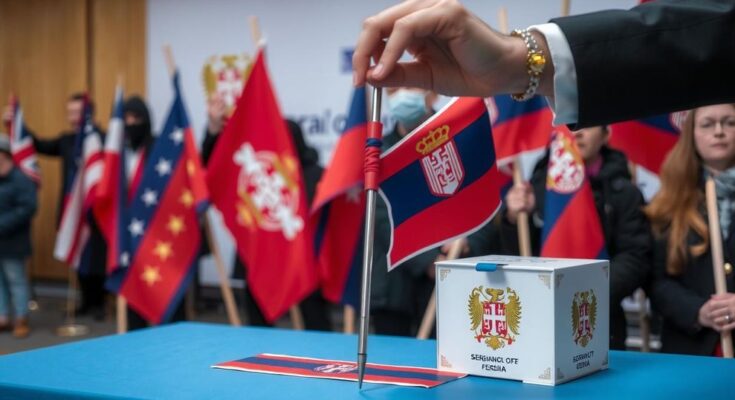Kosovo’s Central Election Commission has barred the Serbian List from the upcoming elections due to its nationalistic views and ties to Serbia. The ruling may escalate tensions between Kosovo and Serbia, with the Serbian List expected to appeal the decision. This event highlights the ongoing political conflicts in Kosovo as it approaches its February 2025 parliamentary elections.
The Central Election Commission (CEC) of Kosovo has officially declined to certify the Serbian List, the principal ethnic Serbian political party, thereby preventing its participation in the forthcoming parliamentary elections scheduled for February 9, 2025. The CEC’s decision stems from the party’s nationalistic ideology and its strong connections to Serbia, particularly the stance of its leader, Zlatan Elek, who has consistently referred to Kosovo as an autonomous province of Serbia rather than recognizing its independence. This decision may exacerbate diplomatic tensions between Kosovo and Serbia, complicating international efforts aimed at normalizing relations between the two nations.
The ruling coalition led by Prime Minister Albin Kurti has been accused by Serbian President Aleksandar Vucic of attempting to eliminate Serbian political representation in Kosovo’s governance. Vucic has also indicated that he discussed the situation with Russian Foreign Minister Sergei Lavrov, emphasizing his belief that Pristina is violating international norms.
Only Kreshnik Radoniqi, the chairman of the CEC, supported the certification of the Serbian List; other commission members either opposed or abstained from the vote. Political analysts expect the Serbian List to contest the CEC’s determination through the Electoral Complaints and Appeals Panel (ECAP), with some predicting that the panel will overturn the decision. At stake are the delicate dynamics of Kosovo’s political landscape and its ongoing strife for recognition from Serbia, which continues to regard Kosovo as within its jurisdiction.
Kosovo’s declaration of independence from Serbia in 2008 has not been recognized by Belgrade, which still considers the territory a province of Serbia. This ongoing dispute significantly influences the political landscape in Kosovo, particularly concerning its ethnic Serbian minority. The Serbian List party, which has strong ties to Serbia, has often been at the center of this political tension, leading to accusations of undermining Kosovo’s sovereignty. The tension surrounding the upcoming elections highlights the fragile stability in the region and the struggle for political representation among different ethnic groups.
The refusal to certify Serbian List by the CEC underscores the continuing political strife in Kosovo and Serbia’s enduring claims over the region. This action, perceived by some as a strategic move to consolidate power ahead of the elections, illustrates the complexities of Kosovo’s path towards recognized autonomy and stability. As the situation unfolds, it will be crucial to monitor the responses from both the Serbian List and the international community regarding this significant political decision.
Original Source: www.rferl.org




